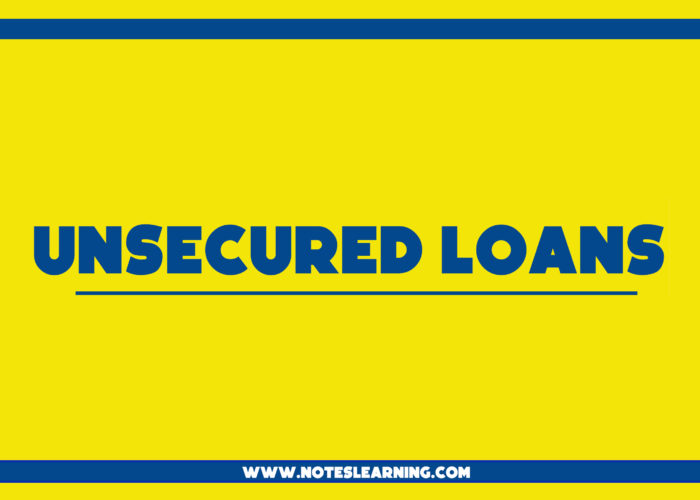Meaning : Unsecured Loan
An unsecured loan is a loan that does not require any collateral. This means, the borrower doesn’t have to provide any form of assets as a guarantee for repayment. This type of loan is not backed by a bank account, home, or any other asset forms.
This type of loan is also referred to as signature loans because as signature is all one needs to execute this loan deal. As unsecured loans are not backed by any type of collateral, lenders might charge higher interest rates and borrowers may need to have a good or excellent credit.
Lenders allow unsecured loans for higher interest rate but in case of any default of such unsecured loan, there is no collateral for the lender to take to recover the outstanding debt.
Illustration
An independent lender provided an unsecured loan to Mr. X. Due to some reason, Mr. X became unemployed and could not repay their unsecured personal loan. Mr. X regularly defaulted the loan. This affected the credit credentials of the borrower. On the other hand, the lender bore the financial loss, as there is no binding evidence for such an unsecured loan.
Differentiating Factors: Unsecured Loans Vs Secured Loans
Basically, there are two prominent factors that differentiate unsecured loans from secured loans. Such factors are:
Higher Interest Rate
Unsecured loans are relatively risker for the lenders. Such loans are a financial loss in case of any default. Also, borrowers do not need to show/submit any assets for such loans. Due to the risk associated with lenders and easy process for borrowers, lenders charge more interest rate for such loans and borrowers are ready to pay higher interest rates. In contrast, secured loans are safer, backed and have low interest rates.
Higher Credit Scores
Unsecured loans demand a higher credit score. Lenders are aware of the default situation so they evaluate the credit worthiness of their borrowers in case of unsecured loans. There is no collateral support to back such an unsecured loan, therefore lenders analyze all the credit worthiness before sanctioning an unsecured loan.
Qualification: Sanction of unsecured loan
Lenders do carefully analyze the borrowers before sanctioning an unsecured loan. Unsecured loans may not require collateral but lenders minimize the risk of default by doing due diligence. Lenders consider the following parameters when one applies for unsecured loans.
- Credit report and Credit worthiness
- Income details
- Debt against the income
- Asset
All these factors reflect the credit worth of the borrower and capacity of borror to utilize the loan amount. Also, all these factors reflect the preparedness of the borrower to pay the loan amount. Better position of borrower in all these factors makes a borrower qualified and credible.
Advantages : Unsecured Loans
- Unsecured loan applications are quicker and less complex, as it doesn’t require much procedure.
- We can borrow smaller amounts of money as unsecured loans.
- Such loans do not require any type of collateral or guarantee.
- They require minimum qualification criteria for borrowers
- The terms and conditions of unsecured loans can be flexible.
- There are fewer restrictions in loan application and disbursal.
- Unsecured loan does not have risk to the asset of the borrower.
Disadvantages: Unsecured Loans
- They generally have higher interest rates.
- There is a limited loan amount for borrowers as it is difficult to lend unlimited funds without collateral (lower borrowing limit).
- There is always a risk of losing the loan amount (default case).
- Such loans are quicker and less complex, but it is difficult for borrowers to qualify for it. Unsecured loan requires trust and it is difficult to gain trust.
Reference

